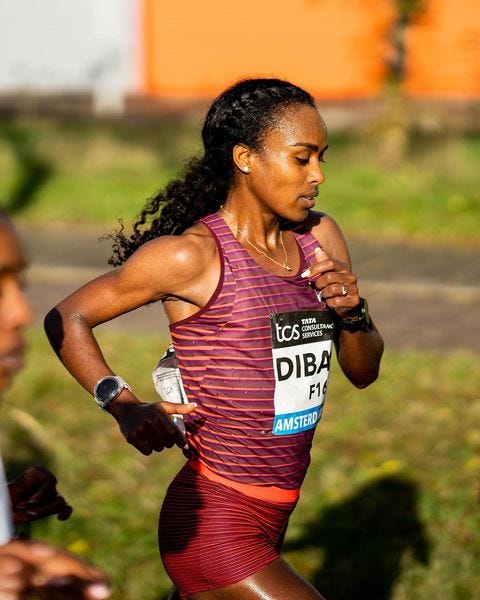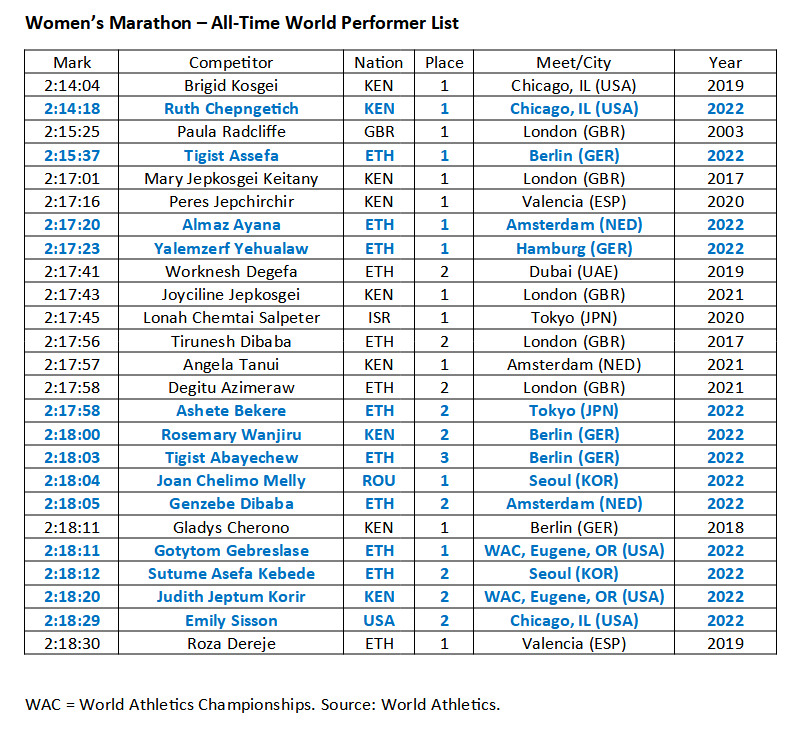Week in Review: Incredible year continues
Ayana fastest of three Ethiopian women to crack 2-hour 20-minute barrier while making their marathon debuts in Amsterdam
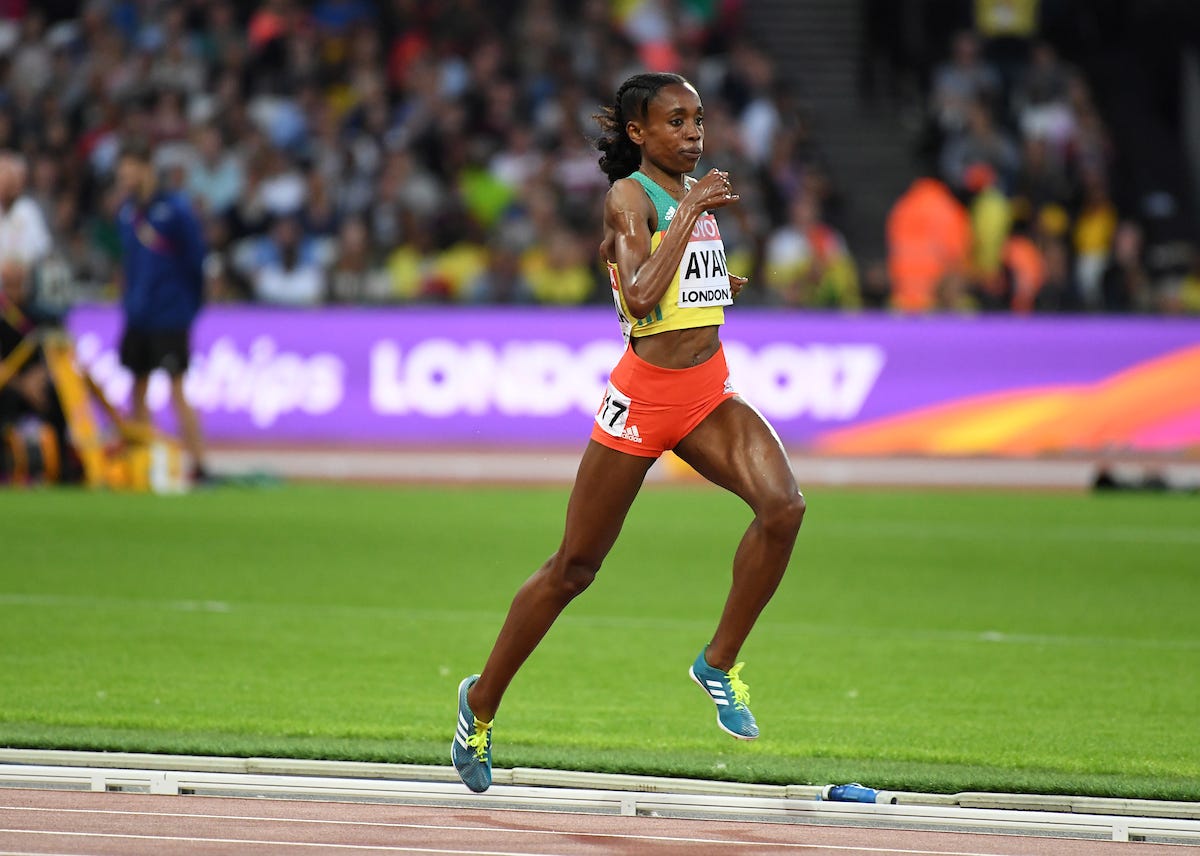
An unprecedented year in women’s marathoning rolled on in the Amsterdam Marathon on Sunday when three more Ethiopians ran well under the once-revered 2-hour and 20-minute barrier while making their debuts in the 26-mile 385-yard event.
Almaz Ayana, Genzebe Dibaba, and Tsehay Gemecha had previously excelled in various distances on the track, but their performances in Amsterdam were still eye-catching as they ran 2 hours 17 minutes 20 seconds, 2:18:05, and 2:18:59, respectively, while becoming the 20th, 21st, and 22nd women to break the 2:20:00 barrier this season.
Prior to this year, no more than 12 women – in 2019 – had broken 2 hours and 20 minutes during the same season.
Ayana’s time bettered the course record of 2:17:57 set by Angela Tanui of Kenya last year and was the fastest marathon debut in history.
“I have no words for this. This is very special and I am very happy,” she said in a post on the World Athletics site. “It was very tough after my Olympic title in 2016 with injuries and pain. I am grateful for my husband, son, and management for all the support.”
The 31-year-old Ayana had won the 5,000 meters in the 2015 World Athletics Championships, as well as the 10,000 in the 2016 Olympic Games and 2017 World Championships. But she had battled injuries and also become a mother during the 2018-21 seasons. She ran a solid – but far from great – 1:07:10 to finish third in the Great North Run half marathon in Great Britain on Sept. 11, but her time on Sunday was the fifth fastest in the world this year, the 11th fastest in history, and moved her to seventh on the all-time world performer list.
It was even more impressive because the former world-record-holder in the women’s 10,000 meters ran the second half of the race a minute and 32 seconds faster than she ran the first half.
Ayana, Dibaba, and Gemecha were among a lead pack of women who ran 16:13 for the first five kilometers before clocking 32:43 (16:30) at 10 kilometers, 49:17 (16:34) for 15 kilometers, 1:05:53 (16:36) at 20 kilometers, and 1:09:26 for the first half of the 42.2-kilometer race.
It was just the three of them running in front when Ayana and Dibaba led through 25 kilometers in 1:22:06 and Ayana led her two compatriots by a second at 30 kilometers in 1:38:03 after running the previous five kilometers in 15:57, the fastest five-kilometer segment of the race.
The 23-year-old Gemecha began to drop off the pace at 33 kilometers, but the 31-year-old Dibaba was just a second off the pace when Ayana came through 35 kilometers in 1:54:01 (15:58).
Dibaba had set the world record of 3:50.07 in the 1,500 in 2015 and also run 14:15.41 in the 5,000 that year, but she could not keep pace with Ayana over the next five kilometers as her countrywoman was 29 seconds ahead of her when she came through 40 kilometers in 2:10:06.
Ayana, who ranks third on the all-time world lists in both the 5,000 (14:12.59) and 10,000 (29:17:45) meters, extended her advantage over Dibaba to 45 seconds at the finish line.
After the first three, Nasnet Amanuel of Eritrea finished fourth in 2:22:45, followed by Rose Chelimo of Kenya in 2:23:12, and Zinash Gerado of Ethiopia in 2:24:21.
Dibaba’s time made her the 19th fastest women’s marathon runner in history and moved her to ninth on the all-time Ethiopia list. However, she currently ranks second on her family’s all-time list as sister Tirunesh Dibaba ran 2:17:56 in 2017.
Of course, 37-year-old Tirunesh is not your typical older sister. She is regarded as one of the greatest female distance runners in history as she won a combined 12 medals in the Olympic Games or World Championships from 2003-17, including three gold medals in the 5,000 and five in the 10,000.
Nonetheless, Genzebe wrote on Instagram that she was thrilled with her performance in her first marathon.
Add Ethiopian distance brilliance: Ethiopian women won the 5,000, 10,000, and marathon in the World Championships in Eugene, Oregon, in July and they have continued to excel in the marathon since then.
Tigist Assefa set a national record of 2:15:37 in winning the Berlin Marathon on Sept. 25 and countrywoman Yalemzerf Yehualaw won the London Marathon in 2:17:26 a week later after winning the Hamburg Marathon in 2:17:23 in April.
Overall, a record 12 Ethiopian women have run under 2 hours and 20 minutes in the marathon this year, with major races still to be contested in Frankfurt, Germany, on Oct. 30; New York City on Nov. 6; Xiamen, China, on Nov. 27; and Valencia, Spain, on Dec. 4.
Turning the tide: Kenyans Eliud Kipchoge (world-record 2:01:09), Amos Kipruto, and Benson Kipruto – no relation to Amos – had won the men’s titles in marathons in Berlin, London, and Chicago in recent weeks, but Tsegaye Ketachew of Ethiopia won the Amsterdam Marathon in a personal best of 2:04:49 after surging into the lead in the final two kilometers of the race.
Titus Kipruto – no relation to Amos and Benson – of Kenya placed second in a personal best of 2:04:54 and Bazezew Asmare of Ethiopia finished third in a career best of 2:04:57.
Getachew ran 2:06:27 to win the Riyadh Marathon in March, but CyBrian Kotut of Kenya was the pre-race favorite as he had run a personal best of 2:04:47 to win the Hamburg Marathon.
The 25-year-old Getachew was amongst the lead pack of runners from the start of the race, but he was content to run a couple of seconds behind the leaders when they came through 5 kilometers in 14:30, 10 kilometers in 29:10 (14:40), 15 kilometers in 43:55 (14:45), and 20 kilometers in 58:40 (14:45).
He was a second back of the leaders as they went through the halfway mark in 1:01:52, 25 kilometers in 1:13:21 (14:41) and 30 kilometers in 1:28:05 (14:45). The pace slowed over the next 10 kilometers as the lead group ran that segment of the race in 30:16, but Getachew stepped on the accelerator shortly after passing the 40-kilometer mark and quickly blew up the lead pack that had included himself, Kipruto, Asmare, Abraham Kiptoo of Kenya, and Kotut.
With the strain of his effort etched on his face, Getachew covered the final 2.2 kilometers in 6:27 and blew kisses to the crowd and kissed the back of his left hand in the final 10 meters of the race.
While Getachew, Kipruto, and Asmare became the 77th, 78th, and 79th men in history to run under 2 hours and 5 minutes in the marathon, Kiptoo finished fourth in a personal best of 2:05:04, Mohamed Esa of Ethiopia placed fifth in a career best of 2:05:05, and Kotut placed sixth in 2:05:15.
Three other runners broke 2:06:00 in the depth-laden race that saw 11 runners dip under 2:08:00 and 17 break 2:10:00.
“The competition was very good, the spectators were great and there was great atmosphere out on the course,” Getachew said. “I was just very pleased. I felt good in the last five kilometers as we went into the park, and especially as we left the park with two kilometers to go.”
Big day for marathons: The Amsterdam Marathon was one of three marathons to be held in major cities across the world on Sunday.
Yihuniligh Adane of Ethiopia ran 2:07:18 to win the men’s race of the Toronto Marathon ahead of the Kenyan duo of Kipkemoi Kiprono (2:08:24) and Felix Kipchirchir Kandie (2:08:44) in second and third.
Antonina Kwanbai of Canada won the women’s division in 2:23:20 to turn back Kenyan Ruth Chebitok in second place – in 2:23:58 – and Ethiopian Geleta Burka in third – in 2:24:31.
More than 8,000 miles – or nearly 13,000 kilometers – away, Stephen Mokoka of South Africa ran 2:09:58 to win the men’s race of the Cape Town Marathon, with Meseret Dinke of Ethiopia winning the women’s division in 2:24:02.
Withdrawal and addition: Organizers of the New York City Marathon announced on Friday that Olympic women’s champion Peres Jepchirchir of Kenya had withdrawn from the Nov. 6 race. But the good news was that former U.S. record-holder Keira D’Amato had been added to the field.
Jepchirchir, the sixth fastest women’s marathon runner in history with a best of 2:17:16, won the Olympic title in Sapporo, Japan, in August of 2021 before winning the New York City Marathon in November of last year and the Boston Marathon in April of this year.
She withdrew from the World Championships in July with an injury to her right hip, but placed second in the Great North Run half marathon in Great Britain eight weeks later.
The 29-year-old did not give specifics about the injury that caused her to withdraw this time, but said she had “worked very hard with my physio team to recover from this injury in time for the race, but we did not have enough time. I believe I will be back stronger next year, but for now, my doctors say I must rest and heal my injury first.”
D’Amato, who set a then-American Record of 2:19:12 in winning the Houston Marathon in January, will be running in her fourth marathon of the year in New York City.
She finished eighth in the World Championships in 2:23:34 after replacing injured Olympic bronze medalist Molly Seidel on the U.S. roster two weeks before the race, and placed sixth in the Berlin Marathon in 2:21:48 on Sept. 25.
She was also a television commentator during the Chicago Marathon on Oct. 9 when Emily Sisson lowered the U.S. record to 2:18:29 while finishing second in the women’s division.
Many people, myself included, figured Berlin would be the final marathon of the year for D’Amato, as it is extremely rare for world-class competitors to contest four marathons in a year. But the 37-year-old mother of two and her support team had previously talked with New York City Marathon organizers about running the race and they made the decision to enter after she recovered quickly from her effort in Berlin and resumed her normal training a short time after.
She noted that Nov. 6 will be her son’s eighth birthday and she is excited about running her first New York City Marathon on that day.
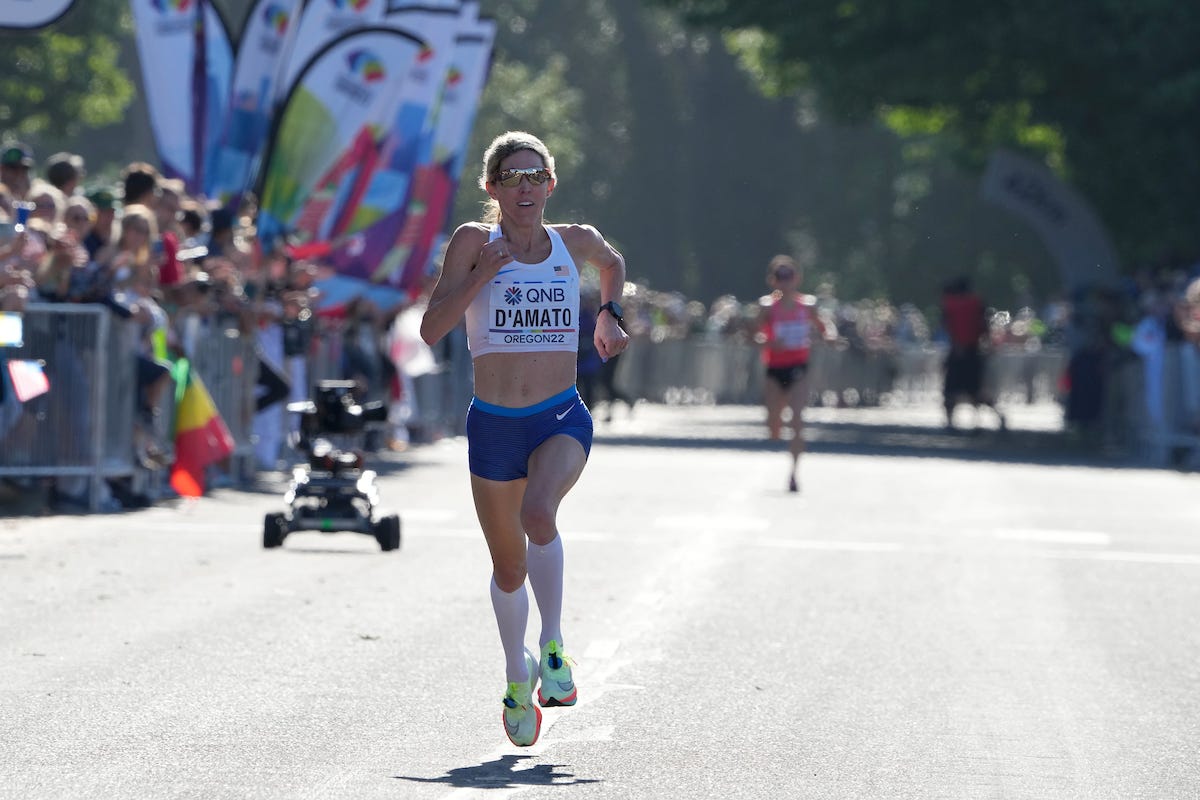
On the performance enhancing drug front: The Athletics Integrity Unity (AIU) announced on Friday that Kenyan distance runners Diana Kipyokei and Betty Wilson Lempus have been provisionally suspended from competition for “various breaches of the World Athletics Anti-Doping Rules (ADR).”
The press release from the AIU stated that Kipyokei and Lempus both tested positive for the banned substance Triamcinolone acetonide from samples that were taken from them last fall. The release stated they are also facing charges of “Tampering or Attempted Tampering with any part of Doping Control (pursuant to Rule 2.5 ADR), including obstructing or delaying the AIU’s investigation through the provision of false information or documentation.”
Kipyokei’s sample was taken after she won the Boston Marathon on Oct. 11 last year and Lempus’ sample was taken after she won the Harmonie Mutuelle Semi de Paris half marathon five weeks earlier.
Kipyokei would be disqualified as the winner of the Boston Marathon if her positive test result is upheld, and the AIU has informed the French anti-doping agency of the investigation into Lempus “so they may take any necessary action within their authority.”
Southern American happenings: For most of the world’s track and field athletes, the Decastar multi-event meet in Talence, France, on Sept. 17 and 18 marked the end of the 2022 outdoor season. However, the South American Games were contested in Asuncion, Paraguay, last week.
The top men’s performances in the four-day meet that concluded on Saturday came from Jose Mendros Martinez of Peru in the long jump (8.07 meters/26 feet 5¾ inches), NCAA champion Claudio Romero of Chile in the discus (64.99/213-2), and Brian Daniel Pintado of Ecuador in the 20-kilometer walk (1:19:43).
The top efforts in the women’s meet were produced by Columbians Flor Denis Ruiz Hurtado in the javelin (62.97/206-7) and Martha Valeria Araujo Sinisterra in the heptathlon (6,112 points).
Araujo Sinisterra’s best marks in the heptathlon came in the 100-meter hurdles (13.34), the javelin (54.22/177-11) and the long jump (6.17/20-3).
Expanding her repertoire?: It would appear that Sydney McLaughlin-Levrone is intent on contesting the 400-meter dash next year, based on an NBC Sports post from last Friday.
The Olympic and World champion in the women’s 400 hurdles, McLaughlin-Levrone has set the last four world records in that event, including a stunning 50.68-second clocking in the World Championships in July that crushed her previous record of 51.41.
“I don’t think we’re going to give up the 400-meter hurdles just yet, but we definitely want to expand to the 400 meters flat and just see what’s possible there,” she said.
McLaughlin-Levrone, 23, who has run six of the top seven times in history in the 400 hurdles, has a personal best of 50.07 in the 400 which she ran in 2018 during her one and only collegiate season at the University of Kentucky. However, she ran a superb 47.91-second anchor leg on the U.S. team that won the 1,600 relay in 3:17.79 in the World Championships.
The world record of 47.60 in the women’s 400 was set by Marita Koch of East Germany in 1985. After the fall of the Berlin Wall in 1989, a multitude of evidence showed that East Germany had run a state-sponsored program that administered performance enhancing drugs to its top athletes. But Koch never tested positive and has always maintained her innocence of any wrong doing.
Salwa Eid Naser of Bahrain ran 48.14, the third-fastest time in history, to win the 2019 World Championships in Doha, Qatar, but she is currently serving a two-year suspension by the Athletics Integrity Unit (AIU) for three whereabouts failures during a 12-month period in the lead-up to that year’s World Championships.
The Nigerian-born Naser, who has maintained that her suspension was based on incorrect evidence, is scheduled to be eligible to compete starting in February of next year.
Challenging schedule: For those who are wondering, it will be possible for athletes to compete in both the women’s 400 and 400 hurdles in the 2023 World Championships in Budapest, Hungary, from August 19-27, but it will require them to run six one-lap races over a period of four and a half days.
A performer attempting the double would begin their quest with a first-round heat of the 400 during the morning of Aug. 20. Heats of the 400 hurdles will start at 6:50 p.m., local time, the following evening, with semifinals of the 400 starting at 9:10 that night.
Semifinals of the 400 hurdles will start at 8:25 p.m. on Aug. 22, with the final of the 400 at 9:35 p.m. the next night. The final of the 400 hurdles will be held at 9:50 p.m. on Aug. 24.
On a good roll: Katelyn Tuohy of North Carolina State University has established herself as the favorite to win the women’s title when the NCAA Cross Country Championships are held in Stillwater, Oklahoma, on Nov. 19.
The Wolfpack sophomore saw to that last Friday when she won the prestigious Nuttycombe Invitational in Madison, Wisconsin. That performance came two weeks after her course-record victory in the Joe Piane Notre Dame Invitational in South Bend, Indiana, on Sept. 30.
Tuohy, who won the women’s 5,000 meters in the NCAA Track and Field Championships in June, clocked 19:44.3 over the 6,000-meter course to finish well ahead of teammate Kelsey Chmiel, who finished second in 19:49.4, and Elise Stearns of Northern Arizona, who placed third in 19:57.5.
Defending NCAA champion North Carolina State, led by the 1-2 finish of Tuohy and Chmiel, totaled 80 points to finish in a tie for first with No. 2-ranked New Mexico. But the Wolfpack won on the tiebreaker, which did not go to the team with the higher-finishing No. 6 runner, which was New Mexico, but to the team that had the advantage when it came to head-to-head matchups between each of its five scoring runners, which was in favor of North Carolina State, 3-2.
Northern Arizona placed third in the team standings with 244 points, followed by Brigham Young with 252, and Notre Dame with 257.
Tuohy looked very comfortable running in the front of the lead pack from the beginning of the race. She was flanked by Chmiel and Wolfpack teammate Samantha Bush for the first two kilometers, but Bush would eventually finish 18th in 20:11.9.
Tuohy, Emily Venters of Utah, and Aubrey Frentheway of BYU were at the front of the lead pack at the midway point of the race, but Tuohy began to push the pace with 1.6 kilometers remaining and had a three-second lead over her closest pursuers when she crested an uphill portion of the course 400 meters later.
Her advantage had doubled over second-place Chmiel with 500 meters remaining in the race, and although her teammate briefly reduced her deficit to about four seconds with 300 meters to go, Tuohy pulled away over the final straightaway that finished up a long uphill grade.
Appearing to be running well within herself, Tuohy turned around after crossing the finish line and gave Chmiel a hug after she had finished before the two of them slapped hands with one another.
“I wanted to make a move maybe around the hills a little more than a K to go, and then just work on slowly picking it up until the last straightaway,” Tuohy said.
Her victory in Wisconsin was similar to her win in South Bend where Tuohy had broken away from NCAA 10,000 champion Mercy Chelangat of Alabama with a kilometer to go in the 5,000-meter race and posted a 15:50.0 to 16:02.1 victory in her season opener.
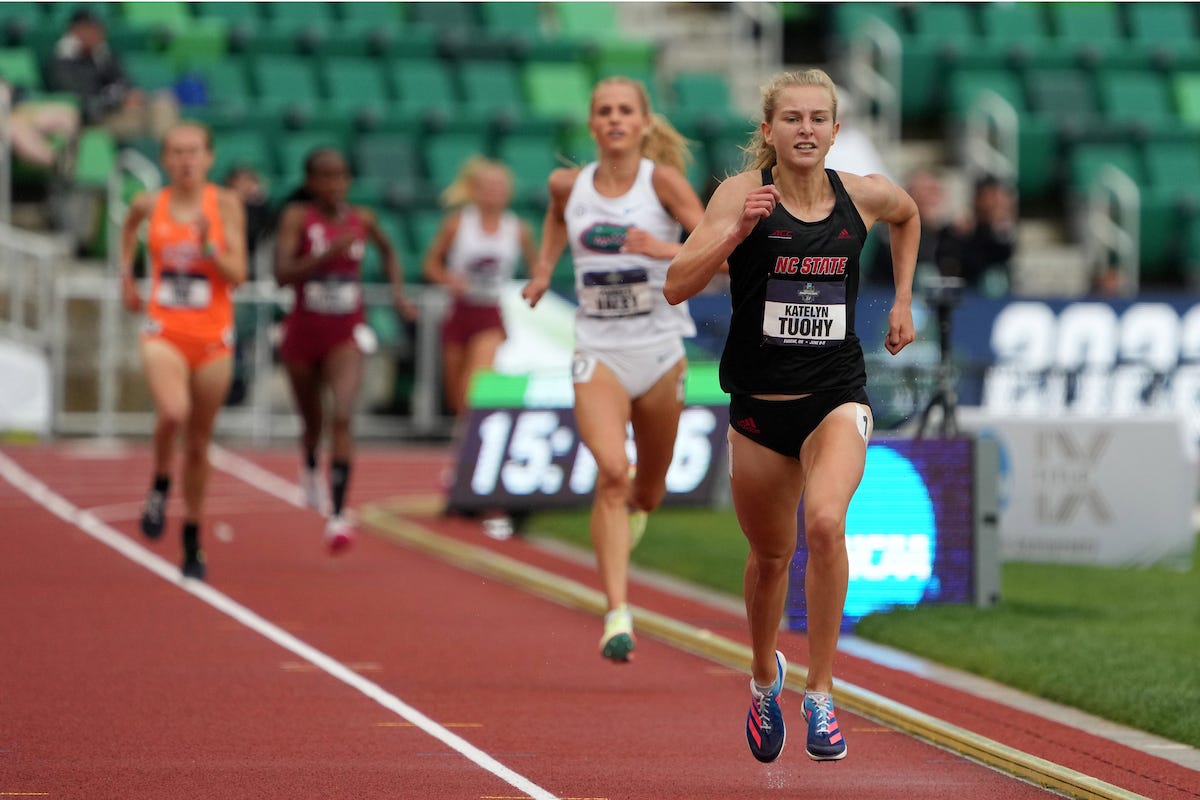
Digging deep: Ky Robinson of Stanford won the men’s title in the Nuttycombe Invitational by closing well over the final 300 meters of the race.
Robinson, a junior who represented Australia in the 5,000 meters in the World Championships in July, clocked 23:09.9 over the 8,000-meter (4.98-mile) course to edge Nico Young of Northern Arizona by a tenth of second. Stanford teammate Charles Hicks placed third in 23:12.7 as the Cardinal totaled 54 points to finish well ahead of top-ranked BYU (89 points), two-time defending NCAA champion Northern Arizona (145), the Air Force Academy (149), and Notre Dame (186).
Stanford and Northern Arizona each had three runners at the front of the lead pack as the field approached the midway point of the race.
Young moved to the front with just under three kilometers to go and a lead pack of Young and teammate Drew Bosley, Robinson and teammates Hicks and Cole Sprout, and Bob Liking of meet host Wisconsin and Acer Iverson of Harvard had emerged with 1.2 kilometers left.
Liking looked more relaxed than anyone with 800 meters left, but he would finish fourth in 23:14.0.
Hicks took the lead with about 400 meters to go, but Young moved into first place with less than 200 meters left in the race. Robinson was in third place, 6-7 meters back of Young at that point, but he took a small lead over Young with about 100 meters remaining and maintained it to the finish line.
“I didn’t know how I was feeling towards the end,” Robinson said. “I was struggling a little bit and then the last 500 meters I was falling off and I felt a second wind and so I thought, Let’s go try and give it a go.”
In memory: Bill Nieder, the 1960 Olympic champion in the men’s shot put, died at his home in Angels Camp, California, on October 7. He was 89.
Nieder, the first man in history to put the shot more than 20 meters (65-7½), won the silver medal in the 1956 Olympic Games in Melbourne, Australia, in November after finishing second in the NCAA Championships for the University of Kansas in June.
He was ranked among the top four putters in the world every year from 1955-’60, including No. 1 rankings in 1957 and ’60.
He had the best put in the world in 1957 with a mark of 18.94 (62-1¾), but he upped the world record three times in 1960, topped by a 20.06 (65-9 ¾) effort at Mt. San Antonio College in Walnut, California, in August.
Nieder traveled to the 1960 Olympics in Rome as an alternate on the U.S. team because he had finished a non-qualifying fourth in the Olympic Trials. But he got a chance to compete in the Games after Dave Davis, the third-place finisher in the Olympic Trials, sustained an injury shortly before the shot put competition.
He trailed U.S. teammates Perry O’Brien – the two-time defending champion – and Dallas Long after the first four rounds of the competition. But he moved into the lead with an Olympic-record effort of 19.68 (64-6¾) in the fifth round and led the U.S. to a 1-2-3 sweep as O’Brien finished second at 19.11 (62-8½) and Long placed third at 19.01 (62-4½).
Nieder later worked for 3M and helped develop the first artificial turf. He also sold the synthetic track surface that was used in the 1968 Olympic Games in Mexico City, the first Games to be contested at an all-weather facility.


